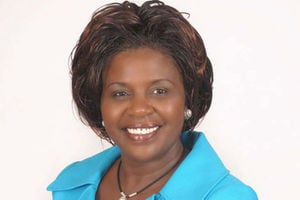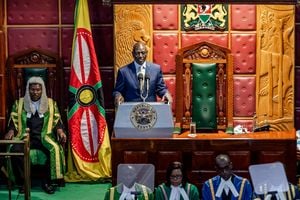Sobering reality: More Kenyan men than women battle mental disorder

Stressed man -more men than women in Kenya are experiencing mental health disorders according to a study.
What you need to know:
- According to a 2022 report, more men in Kenya suffer from mental disorders compared to women.
- The article shares personal accounts of three Kenyan men - Jared who struggled in a stressful marriage, Phillip who faced child abuse, and Samson who craved a father's love and guidance - to illustrate the circumstances that can contribute to mental health issues among men.
Data contained in a 2022 report by Kenya National Bureau of Statistics on status of men and women in the country indicates that 56.9 per cent of men compared to 43.1 per cent of women have mental disorders.
Mental disorders involve significant disturbances in thinking, emotional regulation, or behaviour.
We speak to three men to have an insight on the circumstances under which they fall into these conditions.
A stressful marriage
When Jared* got married in 2018, he looked forward to a happy union with his wife who was a student at a local university pursuing a degree in counselling psychology.
The university lecturer paid her fees. However, her parents did not approve of their marriage because of cultural differences. They are both from the sametribe but he says her family was more liberal than his, which was still conservative, and observed the Kikuyu traditions to the letter.
“My mother had warned me about marrying the girl but I ignored her. How I wish I listened,” says the 39-year-old Jared.
He says his wife would demand huge amounts of money to shop for her parents when she knew he had taken loans to cover her fees.
“She would scold me, claiming I hated her parents. She would tell her mother and the father would call me to tell me, ‘I'm a useless son-in-law’,” he says.
“I felt hopeless and useless. I was lost. I didn’t know who to talk to, so I turned to drinking. I’d leave work and head straight to the bar and drink until the bar manager announces it’s time for closure,” shares Jared.
Last year in October, he says, the parents came for their daughter. They already had a son together. They took him too, and told him they would only return after he had “found himself.”
They lived in Utawala in Nairobi City County where he had bought land and built his family house.
“To my surprise, I felt relieved. These days, I occasionally drink one bottle or two at the maximum,” he says.
Asked if there is anyone he shares his burden with, Jared said, the only person who understands him is his ex-girlfriend.
“Interestingly, my ex-girlfriend is the one who has really helped me feel my worth. I think I’d have committed suicide if it wasn’t for her. When I feel lost, I speak to her. She is very patient with me,” he says.
“For now, I cannot tell whether my marriage still exists or not. If that is marriage, then let it be. I’m tired of feeling like a butterfly flying to I don’t know where.”
Child abuse

On December 25, 2019 Phillip* ran away from their home in Ndeiya area, Kiambu County.
At the time, he was aged 15 and had completed Class Seven. He was fed up with his mother’s unfair treatment. His mother was the head of the household taking care of three children single-handedly. He was the eldest of the three siblings -two brothers and a sister.
“My mother always picked on me. He would beat me up so badly for small mistakes,” says Phillip, now 18- years-old.
“On Christmas Day in 2019, my younger brother and I were fighting over chapati and my mother was so angry with me. She burnt me with the hot spoon she was using while making the chapati,” he says as he touches the mark on his right cheek as we stand under a tree on the edges of Nairobi River, downtown Nairobi.
“At that point, I realised her home was no longer conducive for my stay. So, I ran away,” he says.
He ran to the streets of Nairobi City. For the past three years, he has worked as a casual labourer in construction sites, car cleaner and a porter to provide for himself on the streets.
He has no plan of reuniting with his mother but says he misses his siblings “so much.”
“I wish I had a way of starting my own business such as selling gas cylinders so that I can bring my brother and sister to stay with me. I don’t want them to feel like I abandoned them,” he says.
Craving a father’s love

Samson Ouma. When he lost his IT job in 2020, at the peak of Covid-19 pandemic, he was depressed and the only person he would open up to was his father.
At one point, Samson Ouma was lost. At 12 years, his father died and as the eldest of the four siblings, he had to man up. But deep inside, he was yearning for his father’s love and direction.
“I mourned my father for seven years. I wouldn’t imagine he was gone. Many times, I needed his guidance, assurance and love. That lack left me with a feeling I cannot explain yet people assume boys or men are just okay just because they are not talking or crying,” he observes.
When he lost his information technology officer job in 2020, during the peak of Covid-19 pandemic, he was depressed and the only person he would open up to was his father. He worked at a Nairobi firm. He was also born and raised in Nairobi.
“I’d ask myself ‘what if my dad was here. He would have told me to do this and that.’ I did want to tell my mother what I was going through. I didn’t want to stress her out. She had already struggled enough to raise us.”
Finally, he got help at a safe house in Ngong’ in Kajiado County. At Halfway House, run by Lifesong Kenya, he received counselling and in the founder’s care, his craving for father’s love and guidance was satisfied.
Jared and Phillip are given names as the men preferred to remain anonymous.





